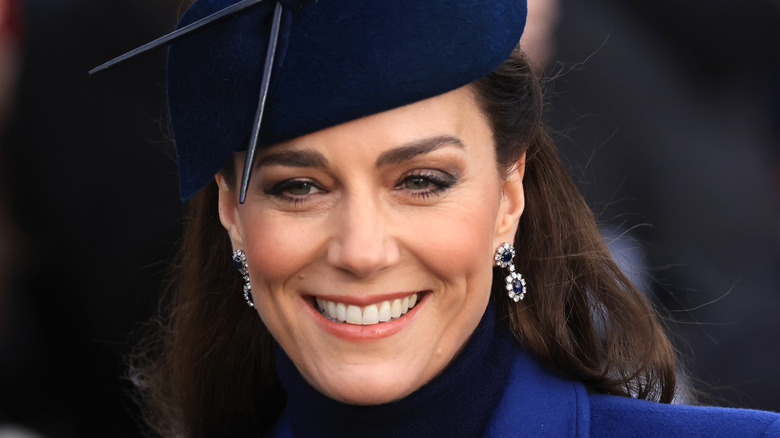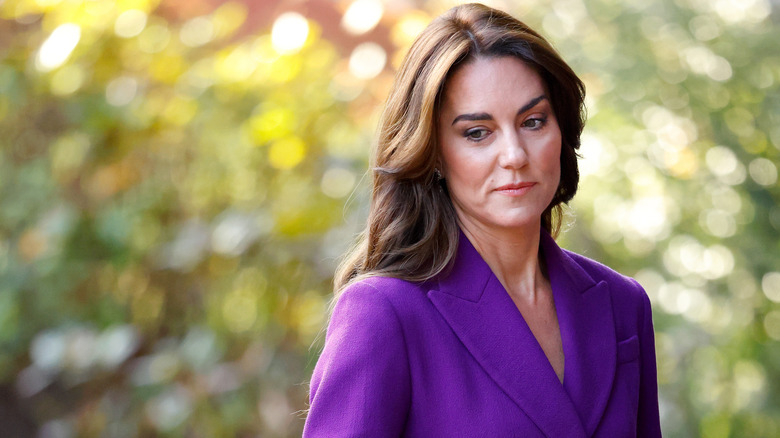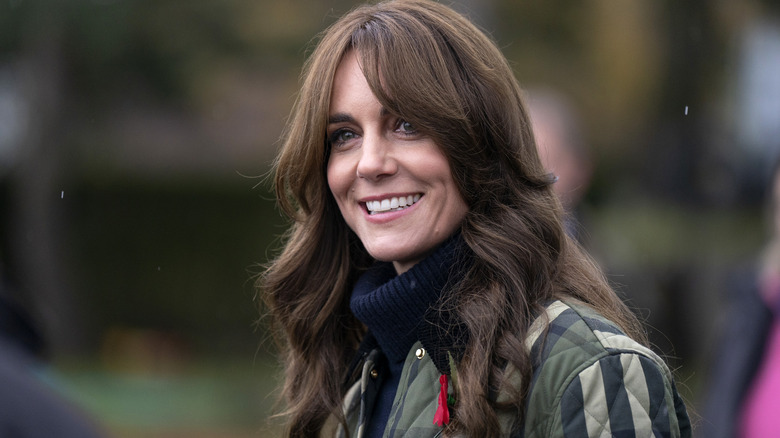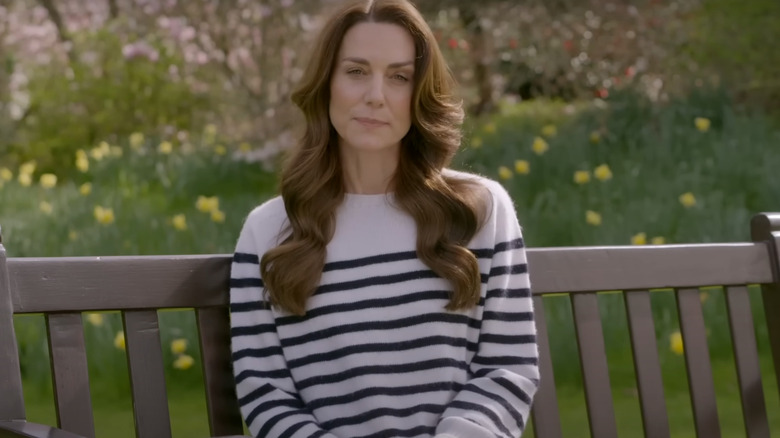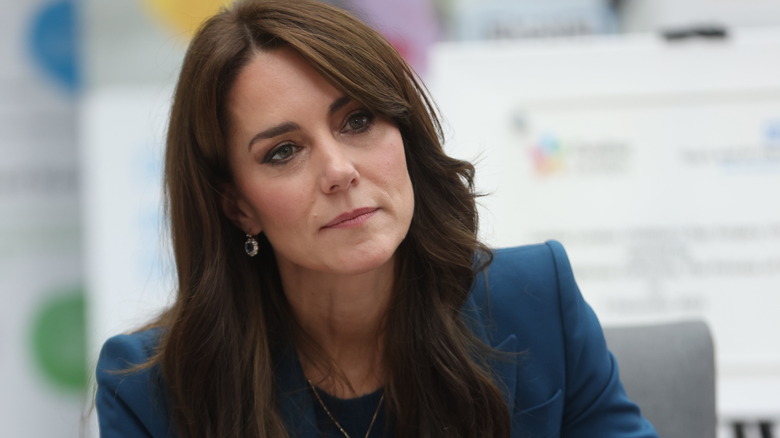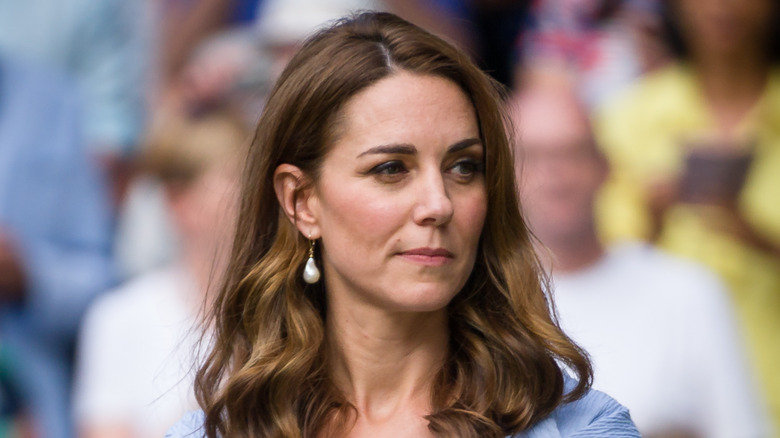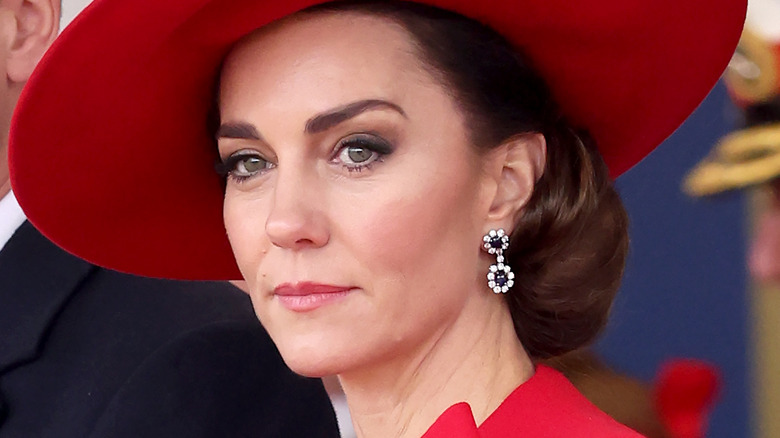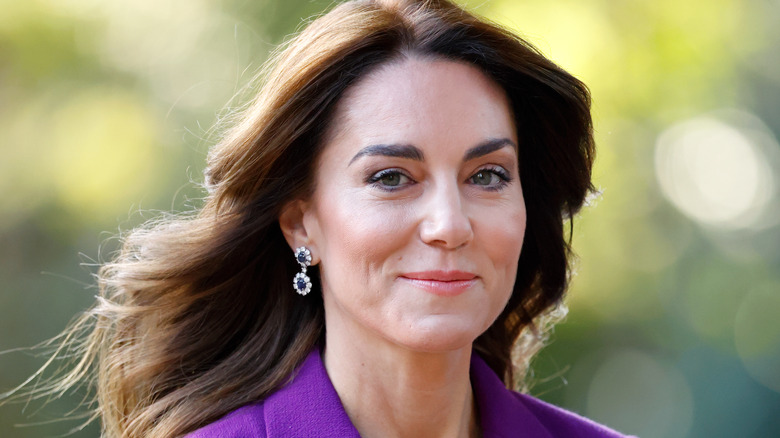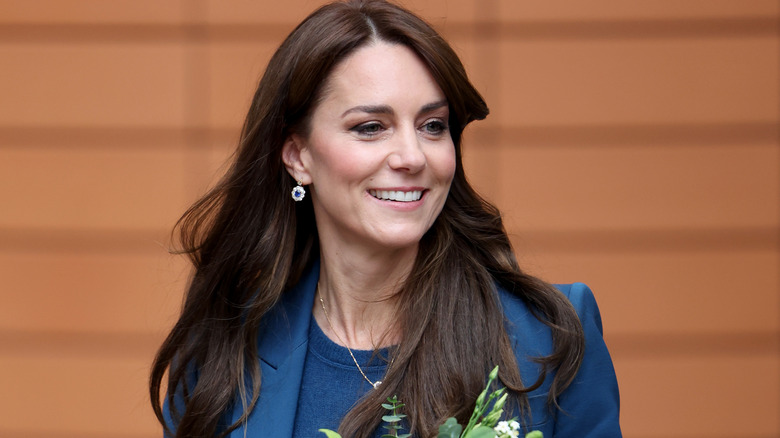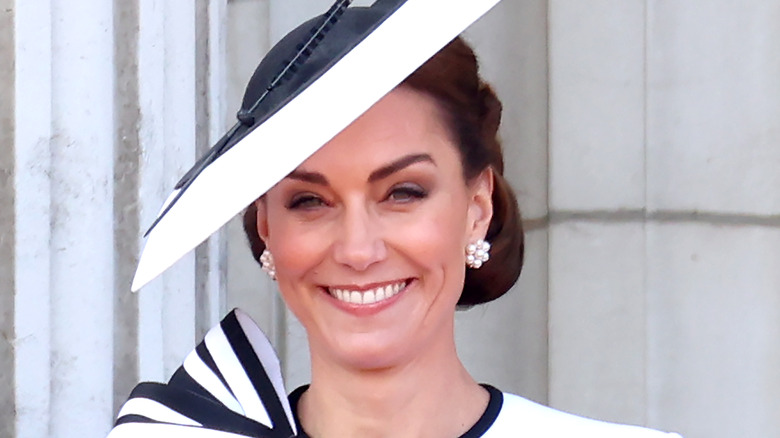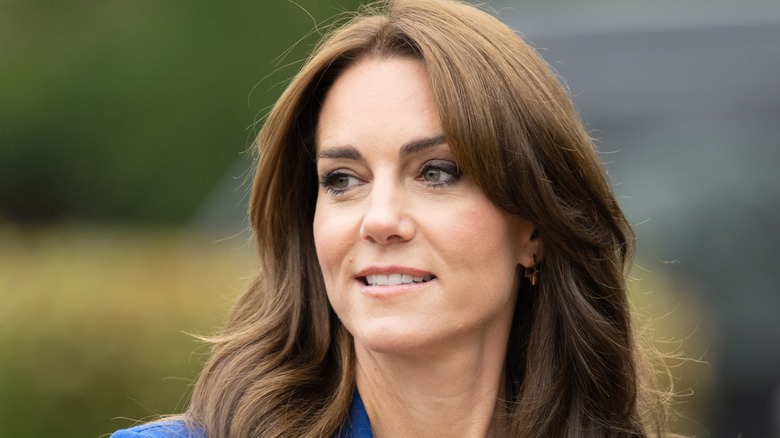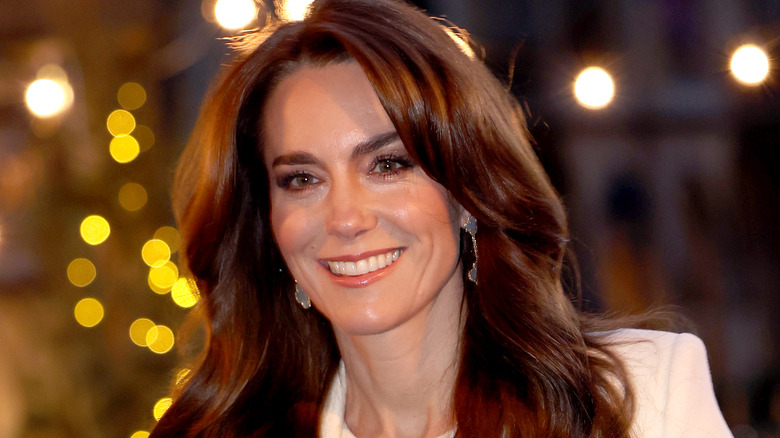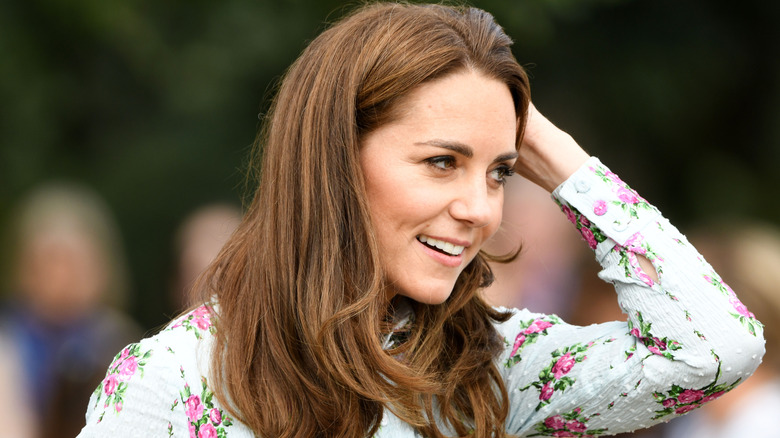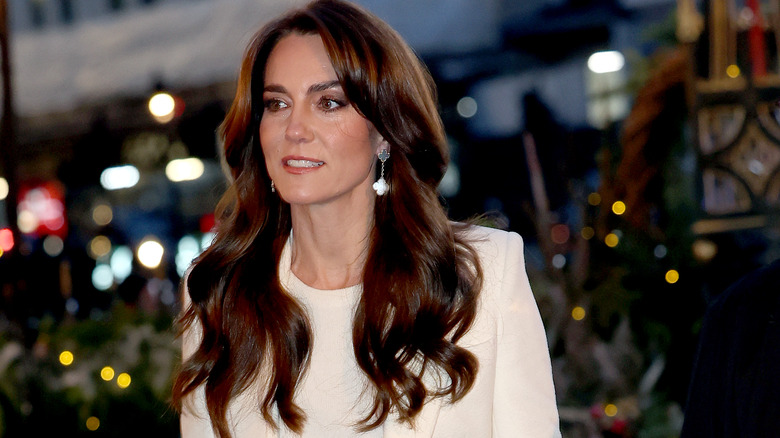Preventative Chemotherapy: Kate Middleton's Cancer Treatment Explained
When Princess Catherine disappeared from the public eye in January 2024 after undergoing unspecified abdominal surgery, rumors ran rampant. By the time March rolled around, the narrative had gotten completely out of control, and even celebrities started to weigh in on the conspiracy theories surrounding the princess' whereabouts. It was internet chaos at its best, and the palace didn't handle the whole media tempest very well.
Finally, on March 22, Catherine released a video statement announcing that she'd been diagnosed with cancer. Many wanted to put their foot in their mouth when the statement was released. Catherine explained that, when she underwent abdominal surgery, doctors didn't expect to find any cancer — this was only determined after the procedure. "My medical team therefore advised that I should undergo a course of preventative chemotherapy, and I'm now in the early stages of that treatment," she explained.
Conspiracy theories turned into well-wishes, but soon, the public and the press had more questions: What is preventative chemotherapy? And what did it tell us about the state of the future queen's health? The Princess of Wales didn't elaborate on what type of cancer she'd been diagnosed with nor provided any details on how far it had progressed before her diagnosis. Catherine's cancer announcement video subsequently left people with more questions than answers, and we're here to answer some of them, or at least try to.
Catherine's treatment offers clues as to what type of cancer she might have
Princess Catherine is remaining tight-lipped about her cancer diagnosis — as is her right — but given that she's receiving preventative chemotherapy, it narrows down the types of cancer she might have a teensy bit.
Ben Ho Park, M.D., told Today that while it could be any type of cancer, the major abdominal surgery Catherine had prior to the discovery of her cancer hints that it might be genital, gastrointestinal, or urinary. Aditya Bardia, M.D., M.P.H., told Everyday Health that colon and breast cancer are often treated with preventative chemotherapy after the surgical removal of tumors. Still, despite the fact that we know Catherine had abdominal surgery, we don't know much else, making it hard for doctors to guess what cancer she might have been diagnosed with. Andrea Porpiglia, M.D., pointed out that abdominal surgery is a pretty common treatment when it comes to removing solid tumors. "There are too numerous possible cancers to list them all," Porpiglia said.
Her treatment also indicates that her cancer might have been stage 2 or higher
Princess Catherine's type of cancer might still be a big mystery, but one thing that's a little clearer is how advanced it may be. Speaking to Everyday Health, Andrea Cercek, M.D., said that preventative chemotherapy isn't a common treatment for stage 1 cancers, which means that Catherine's cancer had likely progressed past stage 1 by the time doctors discovered it in January 2024.
Speaking to Time, Jeremy Jones, M.D., explained that preventive chemotherapy can be prescribed under various circumstances, but it's usually only highly recommended for cancers that are in a later stage and have a high chance of coming back in the future. "[It is prescribed if] there is some concern based on the pathology [of the tumor] or the patient's clinical history to suggest they are at risk of the cancer returning in the future," Katherine Van Loon, M.D., told the outlet, adding that doctors might prescribe this treatment when they are being "ultra conservative," which is usually the case with younger patients like Catherine. This means that Catherine might have stage 1 cancer and her doctors are simply overly careful (which we hope is the case) or it might mean that her cancer is pretty aggressive, was in a later stage, and has a high risk of recurring.
What exactly is preventative chemotherapy?
First things first, preventative chemotherapy isn't a technical medical term. As Katherine Van Loon, M.D., explained to Time, doctors refer to it as adjuvant chemotherapy. And according to Ben Ho Park, M.D., preventative chemotherapy exists to kill remaining cancer cells. "Even though the surgeons have removed everything they can see, there could still be cancer cells floating around in the body that, if left untreated, may come back later (and) is then incurable," he explained to Today.
Theresa Werner, M.D., perhaps described the treatment best while making an appearance on the University of Utah's "Health Library" podcast. "The point of chemotherapy is to eradicate any microscopic residual cells to prevent recurrence. So it's not really preventing the cancer because she already had cancer," Werner explained. While the name of the treatment is a little misleading and indicative of chemotherapy used to prevent cancer altogether, Werner made it clear that it's not the case. "They're not preventing the cancer in the first place. They're preventing a recurrence, and that's why she's getting chemotherapy I think," Werner said.
Andrea Cercek, M.D., describes preventative chemotherapy as an "insurance policy." As she told she told NBC News, "[Catherine's] surgery was successful, and that's the most important thing."
There are different types of preventative chemotherapy
Preventative chemotherapy isn't just one type of treatment — it can consist of various existing cancer treatments and will depend on the patient's diagnosis. According to the Mayo Clinic, radiation therapy, hormone therapy, immunotherapy, targeted therapy, and traditional chemotherapy can be used.
Radiation therapy can be administered in two ways: either by radiation machines which direct beams of energy to parts of the body affected by cancer or through a radiation source that's implanted into the body at the cancer source. The latter is referred to as brachytherapy. Hormone therapy is another option if your cancer is spreading with the help of your hormones — this is often the case with prostate and breast cancer. Hormone therapy works to either block or remove the cancer-causing hormones in the body, which can inhibit the growth of cancer cells.
Immunotherapy, on the other hand, works in tandem with your immune system to destroy cancer cells. This treatment helps the body identify cancer cells (something it can't do on its own) and kill them. Targeted therapy works by attacking cancer cells specifically by targeting the chemicals found in these cells. As these chemicals are blocked, the cancer cells start to die. Chemotherapy, one of the most common treatments for cancer, is given either intravenously or orally. Various chemotherapy medications exist, but they all have one thing in common — they are strong drugs that kill cancer cells throughout the body.
The length of treatment depends on the type of cancer
As of this writing, Princess Catherine has been undergoing preventative chemotherapy for almost five months. She hasn't shared how long her treatment will last, and according to doctors, the duration of preventative chemotherapy can vary greatly depending on what type of cancer is being treated as well as the type of treatment being administered. "[Studies have shown that giving] anywhere from three to six months of chemotherapy after surgery can significantly reduce the risk of cancer coming back," Jeremy Jones, M.D., told Time. "It's standard of care to reduce the risk of recurrence for many types of cancer."
Given that Catherine's cancer treatment started in late February 2024, there's a chance that she might finish treatment in August 2024. Of course, treatment can sometimes take longer depending on a couple of factors, like how well your body responds to the treatment, the time it takes for you to recover between chemotherapy cycles, and how severe the side effects are that you experience. If sources who spoke to Vanity Fair are to be believed, Catherine is responding pretty well to treatment. A source told the outlet in May that the princess had "turned a corner." "It has been a great relief that she is tolerating the medication and is actually doing a lot better," a family friend claimed, adding that the treatment had been challenging nonetheless.
Preventative chemotherapy can only be administered once cancer has already been detected
One of the details Princess Catherine made clear in her cancer announcement video was that her cancer had been surgically removed but that she was receiving preventative chemotherapy. This led to confusion among many that chemotherapy can somehow be used as a preventative measure to keep people from developing cancer in their lifetime. However, this is not the case. Speaking to Utah University's "Health Library" podcast, Theresa Werner, M.D., explained that you can't simply walk into a doctor's office and ask for preventative chemotherapy. "In cases where we can prevent a recurrence, that's why we would do chemotherapy. But to give a healthy person, who might have a chance of cancer, chemotherapy would not be done," Werner explained.
Chemotherapy targets rapidly dividing cells, but many healthy, normal cells in the body divide rapidly, like those found in hair follicles and inside the mouth, which is why chemo patients often lose their hair and develop mouth sores. Additionally, giving someone who has never had cancer chemotherapy treatment likely won't do anything to prevent cancer from occurring, even if they are at a high risk of developing it. "If the cancer is a precancerous lesion or it's eventually going to turn into cancer, it's not a rapidly dividing cell," Werner explained. "So giving somebody chemotherapy, in that sense, to truly prevent cancer from happening in the first place is actually just going to cause side effects."
Preventative chemotherapy is administered in the same way as general chemotherapy
While the objective of preventative chemotherapy is different than that of general chemotherapy, the treatment processes can look similar. Speaking to "Breakfast Television," radiation oncologist Derek Tsang, M.D., explained that both preventative chemotherapy and general chemotherapy can either be injected or administered orally. The only difference, really, is its purpose. "My expectation is that it [Catherine's treatment] would be similar to general chemotherapy in that it would be cycles or doses given every two to four weeks, and then repeat it as the body heals from each dose of treatment," Tsang explained.
As previously noted, it's all about trying to nip the disease in the bud before it returns. "The goal is to mop up any residual cells and treat micro-metastatic disease to prevent disease recurrence," Aditya Bardia, M.D., M.P.H., told Everyday Health. This means that Catherine's preventative chemotherapy and the chemotherapy King Charles III is undergoing for his cancer diagnosis are likely very similar.
The difference between preventative chemotherapy and general chemotherapy
While preventative and general chemotherapy have many things in common, there are some subtle differences between the two, depending on the type of cancer being treated and the patient. Speaking to Time, Jeremy Jones, M.D., noted that preventative chemotherapy is only administered after all the cancer visible to the naked eye has been surgically removed. Jones noted that preventative chemo can often be administered in lower doses, but in many cases, doctors opt for the same dose they would have prescribed if the patient was receiving general chemo.
Preventative chemo is also known to last for a shorter period of time than general chemo, Beth Karlan, M.D., explained. Infusions are received at hospitals, but patients who require longer infusion times often receive a port with a pump that they take home with them, which then continues to administer the chemo over the span of a day. The preventative chemotherapy process usually lasts between three to six months.
Catherine might be tolerating the chemotherapy well
Body language experts say Princess Catherine exhibited some signs of stress over her cancer treatment when she shared the announcement, and who can blame her? Chemotherapy is known for its slew of nasty side effects, and Catherine still has three young children who depend on her. Derek Tsang, M.D., however, told "Breakfast Television" that, despite all the horror stories, some people respond well to chemo. "Depending on the specific type of chemotherapy given, sometimes the body tolerates it extremely well," he said. It seems like Catherine might be one of the lucky ones since she made her first public appearance in June 2024 for King Charles III's birthday celebrations — and she looked well on the day. The royal was seen laughing with her kids and grinning at the public as she waved to them during a carriage ride.
Prior to the king's birthday celebrations, Catherine took to Instagram to share an update on her health and the little things that help her keep her head up. "On the days I feel well enough, it is a joy to engage with school life, spend personal time on the things that give me energy and positivity, as well as starting to do a little work from home," she wrote. She added that she was planning on making some public appearances over the summer, saying she was cautiously optimistic knowing that she's not "out of the woods yet."
But she still has her 'bad days'
Despite appearing to handle her chemotherapy treatments well, Princess Catherine acknowledged in an Instagram post that it hasn't all been easy. "There are good days and bad days. On those bad days you feel weak, tired and you have to give in to your body resting," she wrote. Derek Tsang, M.D., says these symptoms are on par with chemotherapy treatments. "[Chemotherapy] can cause general symptoms like fatigue, sometimes some nausea, sometimes some gastrointestinal upset, though most patients recover well after each cycle of chemotherapy," he told "Breakfast Television."
Tara Narula, M.D., added that lack of appetite, infections, bleeding, bruising, and vomiting are among the other side effects Catherine might be dealing with. When it comes to long-term side effects, Narula told Today that Catherine might be facing challenges related to cardiovascular and organ health. The royal's young age is definitely a plus, but Nerula made it clear that chemo can be tough no matter how old you are, and while preventative chemotherapy might sound less serious, it isn't when it comes to side effects. "This is not a walk in the park. When we say the term preventive, it sounds light and fluffy, but she [Catherine] may be going through a lot this time," Narula said. Royal expert Katie Nicholl echoed this sentiment when she spoke to Entertainment Tonight, saying that Catherine's appearance at Trooping the Colour appeared to take a lot out of her.
There's no telling whether Catherine still has cancer, or whether it might return
Given that Princess Catherine is receiving preventative chemotherapy, there are some lingering questions as to whether or not she actually still has cancer. According to doctors, it's impossible to know. Speaking to Today, Ben Ho Park, M.D., explained that patients who receive preventative chemo are sometimes already cured of cancer after surgery, but doctors can't tell for sure, hence the treatment.
In other unfortunate instances, undetectable traces of cancer can still be left in the body even after treatment is completed. "In truth, we over treat patients every year because we simply don't know (if they still have cancer)," Park admitted. "A lot of patients ... get chemotherapy when they're probably already cured." We sincerely hope the latter is true for Catherine. Park added that there's always uncertainty when it comes to cancer and its treatments, and unfortunately, there's no way for doctors to be 100% sure that the cancer won't return in the future.
The efficacy of preventative chemotherapy varies
Given the uncertainty when it comes to the efficacy of cancer treatments, how effective is preventative chemotherapy really? Well, it depends on a variety of factors, including the type of cancer. A 2017 study published in the journal of The Lancet. Oncology found that patients with stage II or III colon cancer had a reduced risk of mortality and recurrence by 20-30% after receiving preventative chemotherapy. Most doctors seem optimistic about the treatment, with Jeremy Jones, M.D., telling Time that, "anywhere from three to six months of chemotherapy after surgery can significantly reduce the risk of cancer coming back." However, it still depends on the type of cancer since some are more responsive than others.
Beth Karlan, M.D., agreed with Jones' explanation, telling Time, "There is a lot of evidence to support adjuvant chemotherapy impacting overall survival, and allowing patients to live years longer and perhaps even effecting a cure," she said, adding that Catherine's doctors are clearly doing everything in their power to ensure she can live the rest of her life cancer-free. "The example she is providing with her message will have a salutary effect on so many other people," Karlan said.
Catherine's diagnosis shines a light on the uptick in cancer in young adults
Princess Catherine's cancer diagnosis was a huge shock, in part, because of her age — she was only 42 at the time of her diagnosis, which is not an age generally associated with being at risk for cancer, let alone actually be diagnosed with it. This sheds a light on a very concerning matter that has puzzled doctors for a while — an uptick in cancer among young patients. "It's not only older people anymore," Fola May, a cancer researcher at UCLA Health, told The Washington Post. "We need to focus on the messaging that young people need to be aware they are also at risk."
Women, in particular, need to be more vigilant, since studies have found that breast, endocrine, and gastrointestinal cancers have significantly increased between 1990 and 2019 — 15% to be exact — among younger women. Gastroenterologist Joel Gabre, M.D., suspects the environment has something to do with the increase in cancer among young adults, while lifestyle factors like smoking, obesity, and alcohol are also thought to be contributing factors. Family history also plays a part, as well as existing diseases that could predispose people to certain cancers. However, Gabre noted that he's been diagnosing a lot more younger people with colon cancer, of whom many don't have a family history of the disease.
